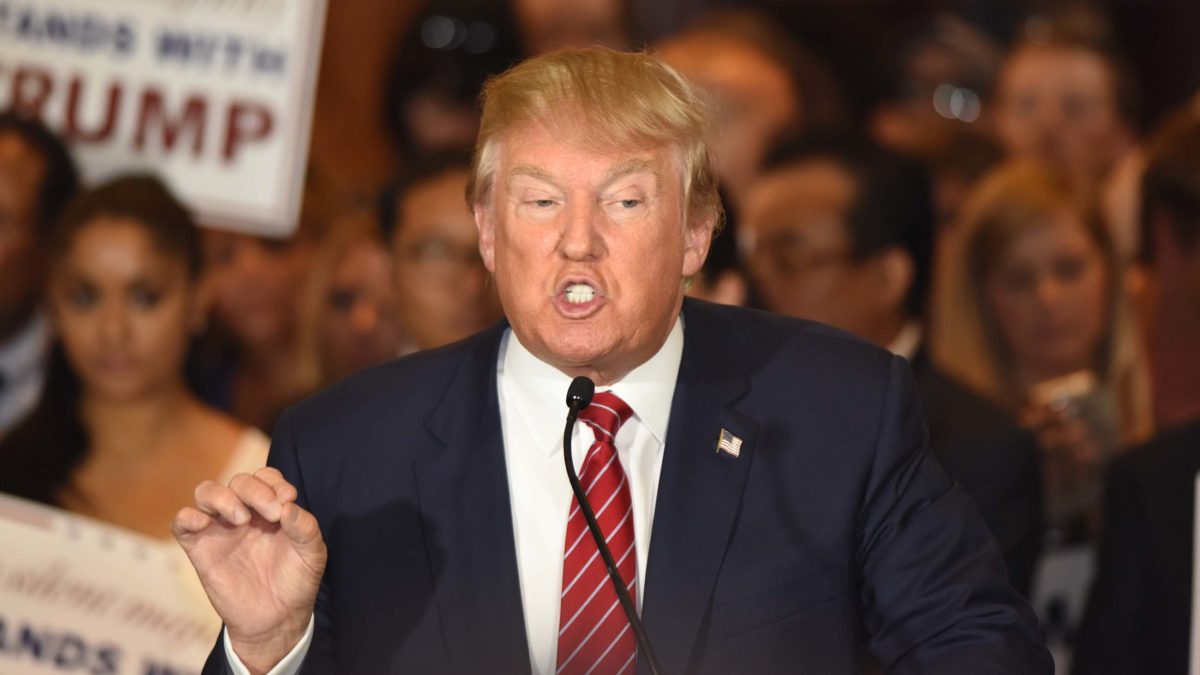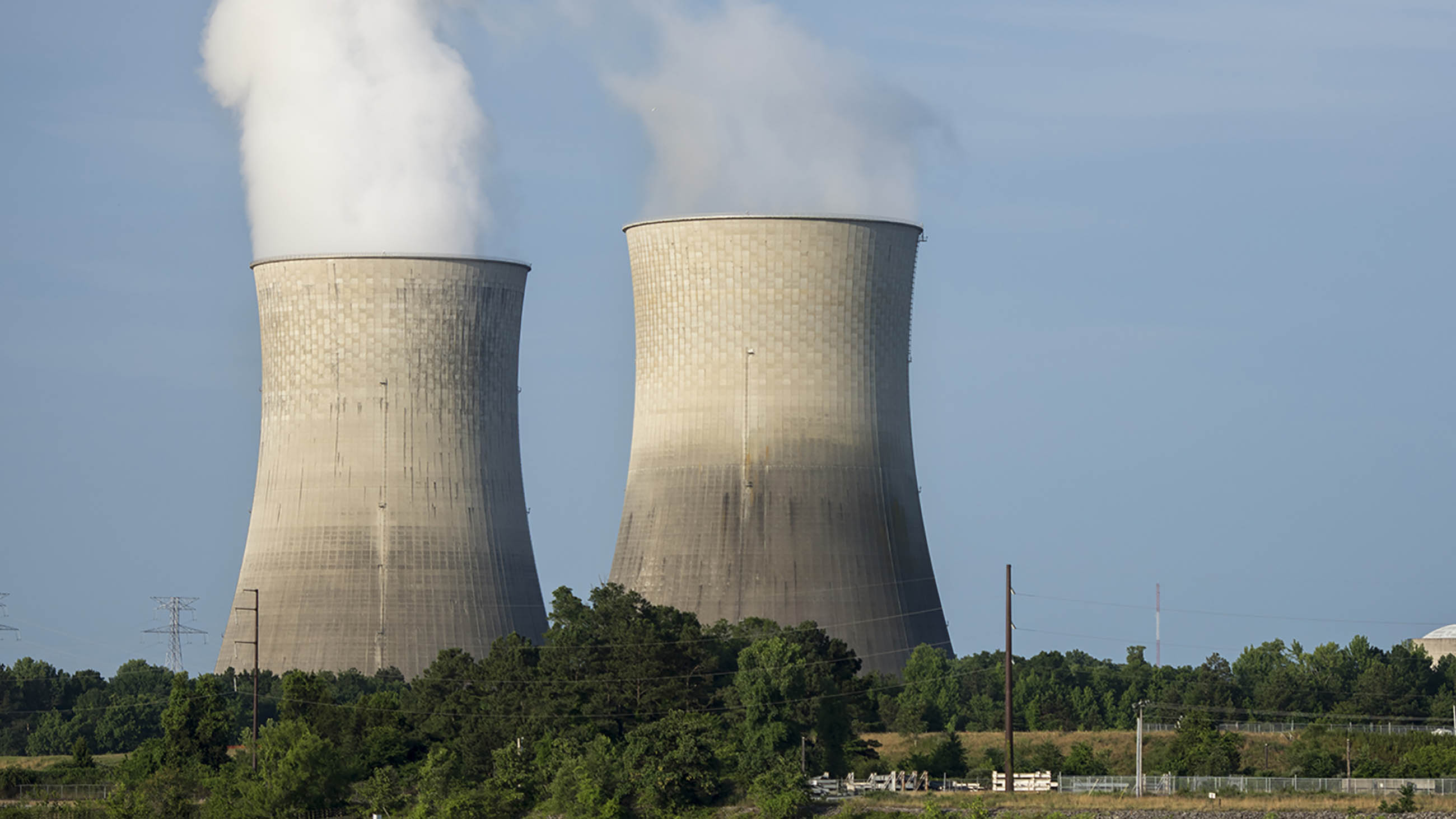Hopes for Nuclear Power Blossom With Trump’s Rise
Will President-elect Donald Trump reanimate the long-stagnating nuclear power industry? That’s hard to say, but if he doesn’t, it won’t be for want of effort on the part of nuclear energy lobbyists like Donald Hoffman, an advisor to Trump on nuclear policy and a possible contender for Secretary of Energy.
In a telephone interview with Undark, Hoffman says he’s counseled the Trump transition team that nuclear deserves a seat at the table.

“We do need nuclear energy,” Trump has said in the past. Nuclear power advocates are hoping that he’ll still think so.
Visual: iStock.com
“I’ve had a chance to speak with him about the importance of nuclear,” says Hoffman, the chief executive of Excel Services Corporation, a nuclear power consultancy, and a former president of the American Nuclear Society. Donald Trump understands the need to stabilize the electrical grid while pursuing energy independence, Hoffman says, and he says he has highlighted the benefits of nuclear energy as a stable and consistent power source.
“The fact is wind and solar are based on environmental conditions that don’t exist all the time,” Hoffman said. “They can’t exist without something that provides grid stability.”
For his part, Trump didn’t spend a great deal of time discussing nuclear power on the campaign trail, but he has expressed views on the technology — most prominently in the aftermath of the meltdown at Japan’s Fukushima nuclear power facility following an earthquake and tsunami in 2011. Speaking to Fox News, Trump said that nuclear power needed to be approached with both expertise and great caution — but that it was a vital part of the energy mix.
“I’m in favor of nuclear energy, very strongly in favor of nuclear energy,” Trump said, adding: “If a plane goes down, people keep flying. If you get into an auto crash, people keep driving.”
Hoffman’s hopes are modest, envisioning nuclear as 25 percent of the energy mix in the U.S. — a 5 percent uptick over the technology’s current share of electricity production. Given that Trump and a Republican-controlled Congress are threatening to follow through on a variety of long-standing and contentious policy initiatives related to energy and the environment, an expanded nuclear footprint might not be such a bad thing on balance.
After all, Trump has vowed to neuter the Environmental Protection Agency, reverse federal climate policy, and eliminate many of the related reforms put in place by the Obama administration. These include a wholesale dismantling of his signature Clean Power Plan, and withdrawal from the climate agreement that Obama helped to forge in Paris last year.
The environmental impacts of all this could be drastic, and clean energy advocates in particular fear that wind and solar power generation may suffer under an administration backed by — and even made up of — fossil fuel lobbyists. Meanwhile, a variety of experts over the years, including former and current Energy secretaries Stephen Chu and Ernest Moniz, have echoed Hoffman’s enthusiasm for nuclear power — or at least its potential role in reducing runaway carbon dioxide emissions.
That’s not to say that nuclear power is without it critics and challenges, including a significant waste problem, high costs, and an aging fleet of reactors, many of which are in the process of being shut down. But if Trump and his supporters in Congress make good on their fossil fuel promises — and the oil and gas industries are certainly salivating at that possibility — might that make nuclear power more attractive to climate activists?
Definitely not, says Greenpeace nuclear policy analyst Jim Riccio.
“Nuclear power doesn’t deserve a seat at the table,” said Riccio in an email to Undark. “As a businessman, President-elect Trump should recognize that nuclear power is stupidly expensive and has priced itself out of the market. Both Wall Street and main street have rightly abandoned new nuclear power and old Fukushima-style nuclear reactors are shutting down because they cannot compete.”
Those sentiments are not shared across the environmental advocacy community, however. Mark Tercek, the president of environmental group The Nature Conservancy, for example, agrees with Secretaries Chu and Moniz and thinks nuclear power should act as a bridge while the United States transitions to renewable energy sources like wind and solar.
“Nuclear power is a, you know, great way to produce clean energy,” Tercek said in a recent online chat. “And our nuclear plants are getting old. And if they’re just shut down that’s just going to make our challenge to transitioning to clean energy even tougher.”
With the imperatives of climate change growing increasingly dire, similar perspectives are percolating among other green groups as well. As The Wall Street Journal reported in June:
The Sierra Club, the country’s oldest and largest environmental group, is debating whether to halt its longtime position in support of shuttering all existing nuclear-power plants earlier than required by their federal operating licenses. The environmental group’s leaders see existing reactors as a bridge to renewable electricity and an alternative source of energy as the group campaigns to shut down coal and natural gas plants.
The Environmental Defense Fund is similarly deciding to what extent it should adjust its policy, potentially lending its support to keeping open financially struggling reactors.
In Illinois, the Natural Resources Defense Council, along with the Sierra Club and EDF, are among the advocacy groups working with Exelon and state lawmakers on a legislative deal that would reverse a decision the company made in early June to close two nuclear reactors in the next two years. The agreement would promote more energy efficiency and renewable energy while ensuring the reactors remain in operation by providing financial recognition for the zero-carbon electricity they produce.
For its part, the Sierra Club strongly denied in a letter to The Journal that it was recalibrating its stance on nuclear. And in any case, not everyone thinks a new flowering of nuclear energy is imminent — in large owing to the boom in natural gas, which competes directly with nuclear power in the electricity generation market.
Pavel Molchanov, an energy analyst with Raymond James & Associates, a financial services firm, says he thinks nuclear power is more likely to remain flat under a Trump administration. “It’s been essentially flat for the last decade,” Molchanov says. “That has nothing to do with who is in the White House. It’s just the nature of nuclear power.”
If anything, Molchanov added, nuclear may lose a bit of market share as natural gas and other competing energy sources gain steam. “The U.S. is not on the verge of a nuclear renaissance,” he said.
Lisbeth Gronlund, a nuclear power expert with the Union of Concerned Scientists, agrees. “The problem that these [nuclear power] companies are having is that they’re competing with natural gas which is so cheap,” she said. “That’s causing a little wave of early retirement. The obvious answer is a price on carbon, then renewables and nuclear would get the benefits that they deserve.”
For his part, Hoffman remains hopeful — though he concedes that his chances of heading up the Department of Energy are slim. Indeed, signs are now pointing to the oil mogul Harold Hamm as Secretary Moniz’s likely successor.
Nonetheless, Hoffman thinks he’s qualified for the spot.
“I do believe that I have a unique capability to serve as the Secretary of Energy,” says Hoffman. “This is my life’s dream. I just want to do great things for my nation. I want to make sure we have the right ideas being implemented.”
This post has been updated to add reference to the Sierra Club’s rebuttal to a Wall Street Journal article describing the group’s position on nuclear power.










